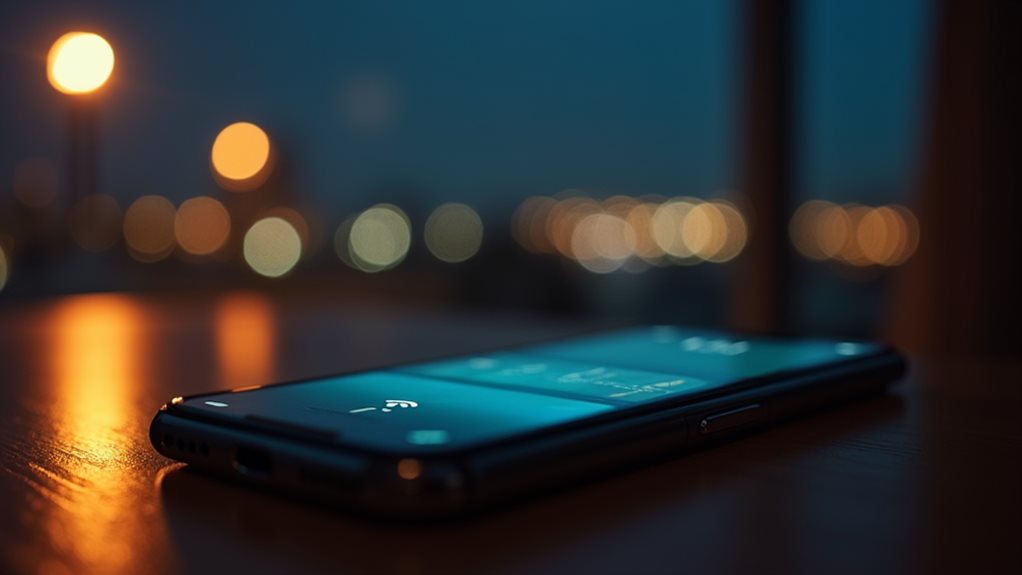Keeping WiFi calling enabled all the time offers more benefits than drawbacks for most users. You'll get better indoor coverage, clearer calls in weak signal areas, and seamless network shifts without any extra costs for domestic calls. While it can slightly impact battery life, modern phones handle this efficiently. However, you'll want to be cautious when connected to public WiFi networks, as they can pose security risks. Consider using cellular data instead of public WiFi for sensitive calls. For regular daily use, especially at home or work with secure networks, WiFi calling serves as a valuable backup that guarantees you're always connected. Understanding its full capabilities will help you maximize this useful feature.
What Is WiFi Calling
WiFi calling technology transforms your smartphone into a versatile communication tool by letting you make calls and send texts over wireless internet connections instead of cellular networks. When you're in an area with weak cellular coverage but have access to WiFi, you'll still be able to stay connected with friends, family, and colleagues seamlessly. Most modern iOS and Android devices now support this feature. This advancement in communication technology provides an improved voice quality that enhances clarity during calls.
Similar to popular VoIP applications like Skype and WhatsApp, WiFi calling converts your voice into data packets that travel through the internet. However, unlike these apps that require separate downloads and profiles, WiFi calling is integrated directly into your phone's native calling system. The technology requires both your carrier and device support to function properly.
You're using the same familiar dialing interface you've always used, making the experience feel natural and comfortable. The technology works by capturing your voice through your phone's microphone, transforming it into digital data, and transmitting it across wireless networks to reach its destination.
Your carrier then processes these signals and routes them appropriately, whether the recipient is using WiFi calling or a traditional cellular connection. This seamless integration means you don't need to worry about whether the person you're calling uses WiFi calling – it just works.
Benefits Of WiFi Calling
WiFi calling transforms your network connectivity by letting you make crystal-clear calls in areas where cellular signals struggle to reach, including basements, remote locations, or buildings with thick walls. Additionally, Wi-Fi calling utilizes Voice over Internet Protocol (VoIP) technology, which ensures reliable communication even in low-signal areas.
You'll appreciate that WiFi calling won't cost you any extra fees for domestic calls while potentially saving money on international calls, as it's typically included in your regular phone plan.
Your phone's battery will thank you too, since WiFi calling often uses less power than searching for weak cellular signals, especially in areas with poor coverage. The convenience of using your existing phone number means you won't need to create new accounts or remember additional login credentials. The feature smoothly transitions between networks while you're on a call, ensuring you stay connected even when moving between WiFi and cellular coverage.
Better Network Coverage
Through the power of wireless networks, you can dramatically expand your mobile coverage area and overcome common cellular dead zones. When you enable WiFi calling, you're joining millions of users who enjoy enhanced network stability and superior call reliability, especially in challenging indoor environments where cellular signals often struggle to penetrate. (VoIP technology) provides the underlying mechanism that makes this possible.
You'll appreciate how WiFi calling serves as your reliable backup communication method, seamlessly shifting between cellular and WiFi networks without disrupting your conversations. Modern buildings with their complex structures make it particularly difficult for cellular signals to reach indoor spaces, making WiFi calling essential for reliable communication. Whether you're in a basement office, a high-rise apartment, or anywhere with weak cellular coverage, you'll stay connected with crystal-clear voice quality. Many users report that signal quality actually matches or exceeds traditional cellular calls.
The system's particularly beneficial when you're traveling internationally, as you can make calls over any WiFi network without incurring expensive roaming charges. Moreover, Wi-Fi Calling allows you to maintain your existing phone number and calling plan, ensuring you stay reachable without additional hassle.
What's more, you're contributing to reduced cellular network congestion when you use WiFi calling. With up to 80% of mobile data already flowing through WiFi networks, you're part of a smarter, more efficient communication ecosystem.
The feature works transparently with your existing phone number and calling plan, ensuring you're always reachable, regardless of cellular signal strength.
Cost-Free Calling Options
While your regular phone bill might strain your budget, WiFi calling opens up a world of cost-free communication options. You'll experience significant cost savings when making domestic calls, as most carriers include WiFi calling in their standard voice plans without extra charges. Your calls will switch automatically to cellular networks if WiFi connection is lost during conversations.
Plus, you're not tied to any contracts or monthly fees when using WiFi calling apps. Popular services like Talkatone simplify communication without requiring traditional calling plans. Furthermore, many carriers now offer WiFi calling features on compatible devices, enhancing user convenience.
Your user experience becomes more flexible as you can transform any internet-connected device into a phone. Whether you're using a tablet, computer, or smartphone, you'll have access to free calling and texting features.
Many apps even let you call real phone numbers without requiring the recipient to have the same application installed.
For international connections, you'll find WiFi calling particularly beneficial. Instead of paying premium rates through traditional cellular networks, you can make international calls at reduced rates or even free through certain apps.
You'll also appreciate additional features like voicemail, call forwarding, and number blocking that come standard with many WiFi calling services.
When using public WiFi networks, just remember to stay mindful of security considerations to protect your conversations. This includes being aware of potential risks associated with using unsecured networks for communication.
Improved Battery Life Performance
Beyond cost savings, you'll notice a significant boost in your device's battery life when using WiFi calling. Your phone won't need to constantly search for cellular signals, which typically drains power faster than maintaining a stable WiFi connection. Users can seamlessly transition between networks during active calls. Voice over IP technology ensures efficient power usage during calls. Additionally, WiFi calling utilizes stable WiFi networks to optimize your device's performance further, ensuring that battery life is maximized.
This smart power management feature becomes especially valuable when you're in areas with weak cellular coverage.
To maximize your battery optimization while using WiFi calling, you'll want to follow some practical guidelines that fellow users have found effective. First, make sure you're connected to a strong, stable WiFi network – this prevents your device from repeatedly switching between WiFi and cellular signals, which can drain your battery.
You'll also benefit from turning off WiFi calling when you're in areas with excellent cellular coverage, as constant network switching can impact your battery life.
For the best results, consider using airplane mode with WiFi enabled when you're in a fixed location with reliable WiFi. This strategy prevents unnecessary power drain from cellular searching while still allowing you to make and receive calls through WiFi, making certain your battery lasts longer throughout the day.
Security Concerns To Consider
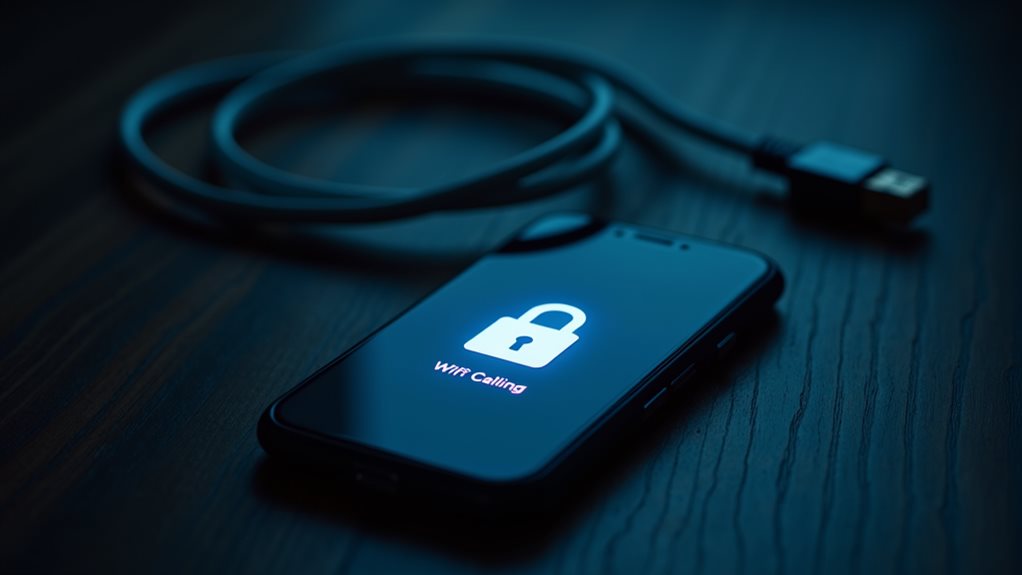
While WiFi calling offers convenience, you'll want to be extra cautious when using public networks, as they're prime targets for cybercriminals looking to intercept your conversations.
Your personal call data, including voice conversations and messaging content, needs robust protection through secure network connections and updated security protocols.
When you're connecting to public WiFi spots, your calls become more vulnerable to potential eavesdropping and data theft, making it essential to use trusted networks whenever possible. Implementing measures such as encryption protocols can significantly reduce the risk of unauthorized access to your calls.
Public Networks Pose Risks
Public WiFi networks present significant security risks when using WiFi calling features. When you're connected to these networks, your conversations and data become vulnerable to various cyber threats that could compromise your privacy and security.
Hackers can potentially intercept your calls through man-in-the-middle attacks, while malicious hotspots might redirect your connection to harmful destinations.
You're particularly exposed to public wifi vulnerabilities when making calls in places like coffee shops, airports, or hotels. These locations often use unencrypted networks, making it easier for cybercriminals to monitor your activities through WiFi snooping and sniffing techniques.
Your device's WiFi calling service can't automatically distinguish between secure and insecure networks, which increases your security risks in public spaces.
To protect yourself while using WiFi calling on public networks, you'll want to take specific precautions. Consider using a VPN to encrypt your connection, verify you're connecting to legitimate networks, and limit sensitive conversations when using public WiFi. Additionally, be aware of the VoIP security risks associated with relying on internet-based calling services in public settings.
Securing Personal Call Data
Security concerns with WiFi calling extend far beyond public networks into the core technology itself.
You'll find that even the fundamental mechanisms designed to protect your calls have significant vulnerabilities, with up to 80% of connections using outdated encryption standards that don't meet today's security requirements.
Your personal call data needs robust data protection measures, especially since current vulnerabilities can expose sensitive information about you.
When you're using WiFi calling, your device might connect to insecure networks due to flaws in the selection process, and predictable traffic patterns can make your calls susceptible to side-channel attacks.
What's particularly concerning is that these vulnerabilities could reveal not just your conversations, but also your identity, call patterns, and even your device information.
To protect yourself, you'll want to implement several security measures.
Consider using a VPN service when making WiFi calls, guarantee your device's software is always up-to-date, and carefully select your WiFi networks. Neglecting security can lead to vulnerabilities that compromise your communication channels.
While WiFi calling is convenient, you shouldn't compromise on security.
Regular updates and awareness of these risks will help you maintain better control over your communication privacy.
Battery Life Impact
Battery drain ranks among the most significant concerns when using WiFi calling. Recent studies show that keeping WiFi calling enabled can reduce your battery life by two to three times compared to standard cellular calls, with some devices lasting only 8-9 hours instead of the usual 24-28 hours.
You'll want to weigh your specific situation carefully when deciding whether to keep this feature on. In areas with strong cellular signal strength, you're better off using traditional calling methods to preserve battery life.
However, if you're frequently in locations with weak cellular coverage, WiFi calling might actually help conserve your battery by preventing your phone from constantly searching for a cellular signal.
The impact on your device's battery life isn't universal – it varies depending on your phone model and network conditions. If you're noticing significant battery drain, consider using WiFi calling selectively rather than leaving it on continuously.
You can easily toggle the feature on when you're in areas with poor cellular coverage and turn it off when you have strong cellular signals.
Signal Quality And Coverage
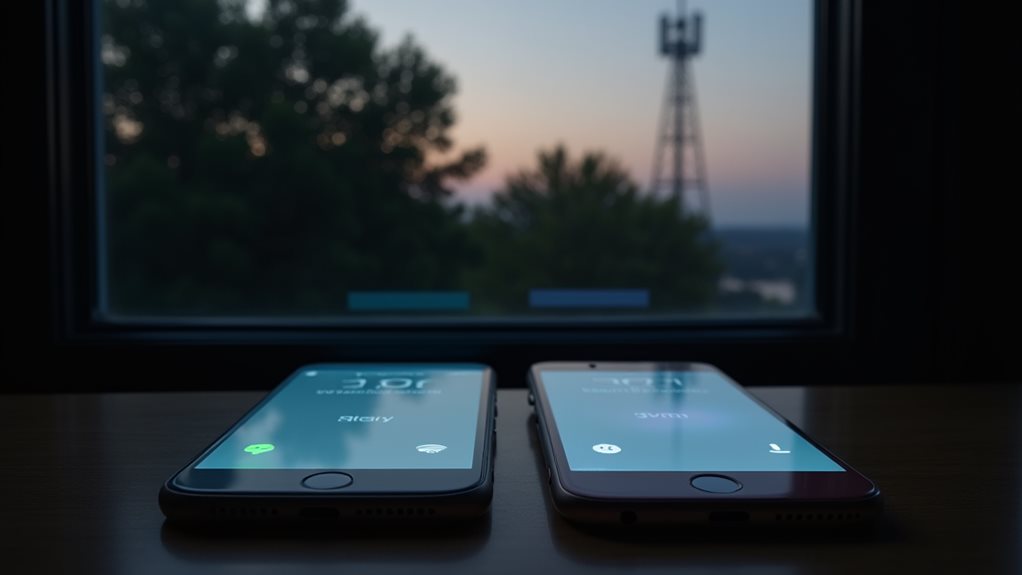
Beyond battery evaluations, signal quality plays a major role in deciding whether to keep WiFi calling enabled. When you're in areas with weak cellular coverage, WiFi calling can be your lifeline for maintaining clear communications. However, you'll need to contemplate potential signal interference and bandwidth competition that could affect your call quality.
In crowded venues where you're sharing WiFi with many others, you might experience degraded call quality due to network congestion. You'll often find that your home WiFi network provides more reliable service than public hotspots, which can be unpredictable.
If you're frequently in locations with poor cellular coverage but stable WiFi connections, keeping WiFi calling enabled makes sense for consistent communication. To optimize your experience, you can adjust your phone's settings to "prefer WiFi" when you're in locations with strong, stable internet connections. This guarantees you're getting the best possible call quality without dealing with dropped calls or audio issues.
Just remember that not all WiFi networks are created equal – you'll want to test the connection quality before relying on it for important calls. Additionally, consider the reliability of Internet connections when using WiFi calling, as this can significantly impact your overall communication experience.
International Travel With WiFi Calling
International travelers face unique considerations when using WiFi calling abroad. You'll need to understand WiFi calling regulations and familiarize yourself with your carrier's specific international rates to avoid unexpected charges.
When you're traveling overseas, your regular domestic plan mightn't cover international WiFi calls, leading to potentially significant costs.
- T-Mobile users on unlimited plans face World Class Calling rates when making WiFi calls outside the US.
- AT&T subscribers can reduce costs with specific add-ons like AT&T Passport for over 210 destinations.
- Cruise ship and airline networks charge premium rates, often much higher than standard international calls.
To manage your costs effectively while staying connected abroad, you'll want to explore alternative solutions.
Consider using data-based services like Skype or Google Voice, which can offer more economical rates than traditional carrier charges. You might also benefit from purchasing international add-ons before your trip, but remember to cancel them upon return. Additionally, exploring VoIP technology can further enhance your communication options by ensuring lower costs for international calls.
These international calling tips can help you stay connected without breaking the bank. If you're frequently traveling internationally, investing in a portable WiFi device could provide a more cost-effective long-term solution for your communication needs.
Device And Network Compatibility
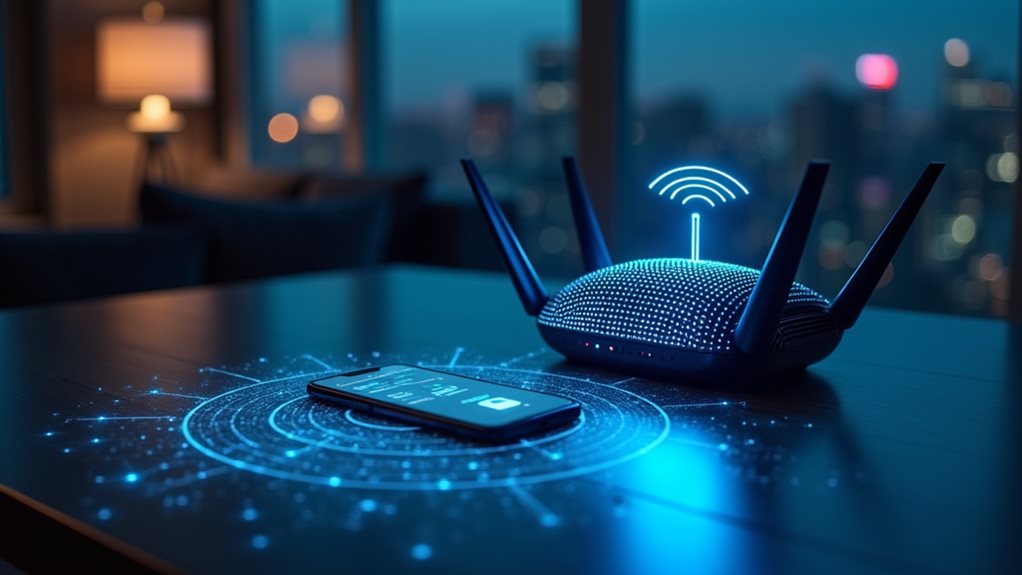
WiFi calling compatibility largely depends on both your device's specifications and your network's configuration. If you're using an iPhone, you'll need a model from iPhone 6 or newer, while Samsung users can utilize WiFi calling on Galaxy S series (S5 and up) and recent Note devices.
For Android enthusiasts, various LG models, including the G and V series, also support this feature.
Your network setup plays an equally important role in device compatibility. You'll need to verify your router allows IPSec pass-through and has specific ports open – typically 500 and 4500.
If you're on AT&T, your router's MTU should be set to 1500 for peak performance. T-Mobile users might need to configure a dedicated SSID in corporate environments, while Verizon customers should be aware that occasionally toggling Airplane Mode can help stabilize connections.
To get the most from WiFi calling, keep your device's software updated and check your network requirements regularly.
Whether you're using an iPhone, Samsung, or another supported device, proper network configuration guarantees you'll stay connected when traditional cellular service isn't peak.
Cost Effectiveness For Users
Today's budget-conscious users will find significant savings through WiFi calling, especially compared to traditional cellular plans. When you're analyzing your cost preferences, you'll discover that WiFi calling can reduce your monthly expenses by utilizing your existing internet connection, particularly for international communications.
- Save 30-50% on your calling costs by switching to WiFi calling services
- Make international calls at rates as low as $0.008 per minute through VoIP services
- Enjoy free app-to-app calls when both parties use the same platform
A thorough cost analysis reveals that you'll benefit most when making international calls or when you're trying to stay within a limited data plan.
Most carriers now include domestic WiFi calling in their standard voice plans at no extra charge, making it an attractive option for your daily communication needs. You're also likely to appreciate that WiFi calling doesn't count against your cellular data allowance when you're connected to a wireless network.
For maximum value, you can combine WiFi calling with unlimited talk plans, ensuring you're always connected without worrying about additional charges or minute restrictions.
Making The Right Choice
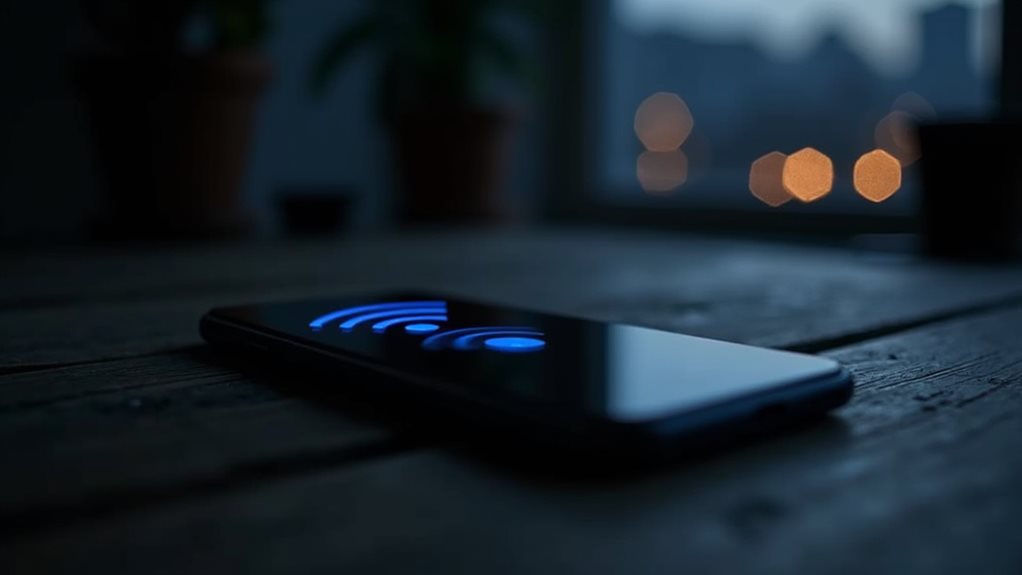
Making an informed decision about keeping WiFi calling enabled depends on several important factors that directly impact your daily communication needs. Your user experience largely hinges on where you spend most of your time and the reliability of available WiFi networks in those locations.
Consider your typical environment and user preferences carefully. If you're frequently in areas with poor cellular coverage but have access to stable WiFi networks, keeping the feature enabled makes sense.
However, if you often find yourself in crowded public spaces where network congestion is common, you might want to be more selective about when you use WiFi calling.
Your device's compatibility also plays an important role in this decision. If you're using a newer smartphone that fully supports WiFi calling, you'll likely enjoy better performance.
Just remember to weigh the security risks, especially when connecting to public networks. You can protect yourself by being selective about which WiFi networks you trust and perhaps disabling the feature when you're away from secure networks.
Ultimately, the right choice depends on balancing convenience with security while ensuring reliable communication in your daily routine.
Frequently Asked Questions
Can Wifi Calling Work During Power Outages if I Have Backup Power?
Yes, you'll maintain WiFi calling capability during outages if you've got backup power sources for your router and modem. Just make sure you've secured reliable backup connectivity to keep your WiFi network running smoothly.
Does Wifi Calling Affect the Quality of Photos and Videos Shared During Calls?
Yes, your photo quality and video clarity can be affected during Wi-Fi calls, especially on congested networks. You'll notice better results when you're connected to strong, stable Wi-Fi with speeds above 5 Mbps.
Will Wifi Calling Automatically Switch to Cellular if Wifi Connection Drops?
Yes, you'll stay connected seamlessly! Your wifi calling automatically switches to cellular fallback when your wifi drops. You don't need to worry – your device handles the shift smoothly so you won't miss a beat.
Can Multiple People Use Wifi Calling Simultaneously on the Same Network?
Yes, you can share wifi calling with others on your network. Just keep in mind that having multiple users may lead to network congestion, which could affect call quality if your internet speed isn't sufficient.
Does Using a VPN While Wifi Calling Impact Call Quality or Security?
Yes, your VPN can affect WiFi calling. You'll often experience call latency and potential quality issues, though VPN encryption adds security. For the best experience, you might want to disable VPN during important calls.
Final Thoughts
Whether you should leave WiFi calling on depends on your specific circumstances. If you're often in areas with poor cellular coverage, work from home, or travel internationally, keeping it enabled makes sense. However, if you've got reliable cellular service and are concerned about battery life, you might want to activate it only when needed. Consider your usage patterns, coverage needs, and device capabilities to make the most practical choice for your situation.

